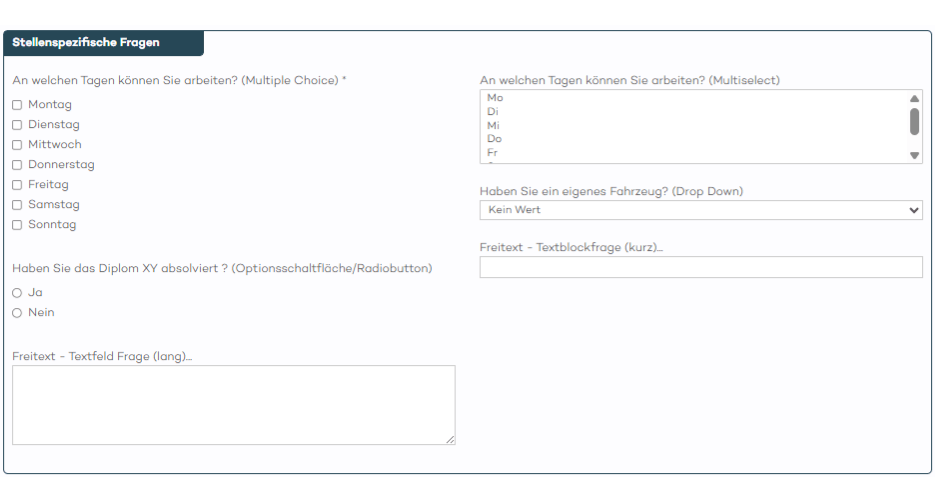Make your application process efficient from the start – for both the applicants and yourself. Application-form-questions are a great way to achieve this. Open positions are often linked to specific requirements. If you ask all candidates to answer essential questions while filling out the form, you can exclude some applicants early on and already mark initial favorites for interviews. This saves you time and effort, as you don't have to manually review CVs and can quickly identify which applicants do not meet critical requirements – such as a valid work permit or a driver’s license.
How many questions should there be?
Efficiency is also key when choosing your questions: They should provide important and concise answers and not take up too much of the candidates’ time – especially in the War for Talents. Weigh your options carefully: Can you even afford to include application-form-questions for the given vacancy? Many companies are now moving away from requiring a CV and instead opt for pre-qualifying questions. Application-form-questions are especially useful for roles with a high volume of applications.
Too many questions should be avoided at all costs. Three to six questions provide a good guideline. Just as important: Make sure the questions are truly relevant to the recruiting process and legally permitted (questions about sexual orientation, marital status, or pregnancy are not) and don’t create bias in the overall process. Choose questions that reveal more about the applicant's personality, skills, qualifications, and expectations.
Examples of insightful application form questions
An intuitive e-recruiting solution like Refline offers you the option to integrate various question types into the application form. You can also define whether each question is optional or mandatory. Typically, the following types of questions are available:
- Knock-out questions: If a position requires certain “killer criteria” – for example, a specific diploma or driver’s license – you can use a single-choice question (radio button yes or no).
- Multiple choice and selection questions: For questions regarding the “hard facts” of employment conditions (e.g. work percentage, salary expectations, presence days, travel requirements), multiple-choice, checkboxes or dropdowns with predefined answers are ideal to assess job fit.
- Open questions: Open-ended questions with a free-text response are useful if you want a more detailed answer – for example, when asking about values, goals, or motivation. Of course, the possibilities for different types of questions are virtually endless. Still, here are some interesting examples that help you learn more about candidates right from the start:
- What is your salary expectation?
- What is your notice period and why are you looking to change employers?
- Which languages do you speak?
- Are you open to travel and do you have a driver’s license?
- How familiar are you with Tool X?
- Have you worked on similar projects?
- If yes, what exactly was your role? What are your two biggest achievements in your last position?
- How does our position align with your long-term goals?
- Why do you consider us a suitable employer?
- How do you define success for yourself?
- What role do you typically take on in a group?
- How do you envision your first three months with us?
Here’s an overview of the different question types:

Optimize your application processes – with Refline
Successful recruiting processes take time. And time is often scarce in HR. With our e-recruiting software, you get innovative support right at your desk: The wide range of features helps you reduce administrative workload by up to 70%. Application forms with selected application-form-questions can also be easily and quickly created using the tool. Get to know these and many other useful functions in a live demo or contact us directly for a non-binding consultation.